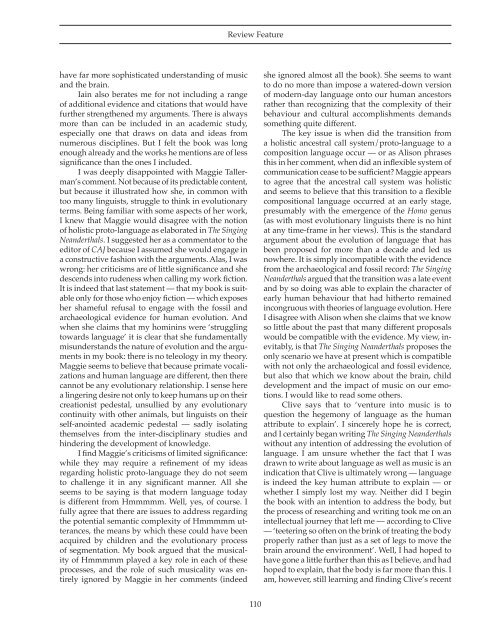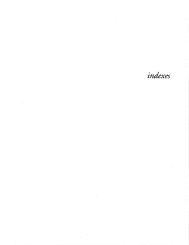The Singing Neanderthals: the Origins of Music, Language, Mind ...
The Singing Neanderthals: the Origins of Music, Language, Mind ...
The Singing Neanderthals: the Origins of Music, Language, Mind ...
You also want an ePaper? Increase the reach of your titles
YUMPU automatically turns print PDFs into web optimized ePapers that Google loves.
have far more sophisticated understanding <strong>of</strong> music<br />
and <strong>the</strong> brain.<br />
Iain also berates me for not including a range<br />
<strong>of</strong> additional evidence and citations that would have<br />
fur<strong>the</strong>r streng<strong>the</strong>ned my arguments. <strong>The</strong>re is always<br />
more than can be included in an academic study,<br />
especially one that draws on data and ideas from<br />
numerous disciplines. But I felt <strong>the</strong> book was long<br />
enough already and <strong>the</strong> works he mentions are <strong>of</strong> less<br />
significance than <strong>the</strong> ones I included.<br />
I was deeply disappointed with Maggie Tallerman’s<br />
comment. Not because <strong>of</strong> its predictable content,<br />
but because it illustrated how she, in common with<br />
too many linguists, struggle to think in evolutionary<br />
terms. Being familiar with some aspects <strong>of</strong> her work,<br />
I knew that Maggie would disagree with <strong>the</strong> notion<br />
<strong>of</strong> holistic proto-language as elaborated in <strong>The</strong> <strong>Singing</strong><br />
<strong>Neanderthals</strong>. I suggested her as a commentator to <strong>the</strong><br />
editor <strong>of</strong> CAJ because I assumed she would engage in<br />
a constructive fashion with <strong>the</strong> arguments. Alas, I was<br />
wrong: her criticisms are <strong>of</strong> little significance and she<br />
descends into rudeness when calling my work fiction.<br />
It is indeed that last statement — that my book is suitable<br />
only for those who enjoy fiction — which exposes<br />
her shameful refusal to engage with <strong>the</strong> fossil and<br />
archaeological evidence for human evolution. And<br />
when she claims that my hominins were ‘struggling<br />
towards language’ it is clear that she fundamentally<br />
misunderstands <strong>the</strong> nature <strong>of</strong> evolution and <strong>the</strong> arguments<br />
in my book: <strong>the</strong>re is no teleology in my <strong>the</strong>ory.<br />
Maggie seems to believe that because primate vocalizations<br />
and human language are different, <strong>the</strong>n <strong>the</strong>re<br />
cannot be any evolutionary relationship. I sense here<br />
a lingering desire not only to keep humans up on <strong>the</strong>ir<br />
creationist pedestal, unsullied by any evolutionary<br />
continuity with o<strong>the</strong>r animals, but linguists on <strong>the</strong>ir<br />
self-anointed academic pedestal — sadly isolating<br />
<strong>the</strong>mselves from <strong>the</strong> inter-disciplinary studies and<br />
hindering <strong>the</strong> development <strong>of</strong> knowledge.<br />
I find Maggie’s criticisms <strong>of</strong> limited significance:<br />
while <strong>the</strong>y may require a refinement <strong>of</strong> my ideas<br />
regarding holistic proto-language <strong>the</strong>y do not seem<br />
to challenge it in any significant manner. All she<br />
seems to be saying is that modern language today<br />
is different from Hmmmmm. Well, yes, <strong>of</strong> course. I<br />
fully agree that <strong>the</strong>re are issues to address regarding<br />
<strong>the</strong> potential semantic complexity <strong>of</strong> Hmmmmm utterances,<br />
<strong>the</strong> means by which <strong>the</strong>se could have been<br />
acquired by children and <strong>the</strong> evolutionary process<br />
<strong>of</strong> segmentation. My book argued that <strong>the</strong> musicality<br />
<strong>of</strong> Hmmmmm played a key role in each <strong>of</strong> <strong>the</strong>se<br />
processes, and <strong>the</strong> role <strong>of</strong> such musicality was entirely<br />
ignored by Maggie in her comments (indeed<br />
Review Feature<br />
110<br />
she ignored almost all <strong>the</strong> book). She seems to want<br />
to do no more than impose a watered-down version<br />
<strong>of</strong> modern-day language onto our human ancestors<br />
ra<strong>the</strong>r than recognizing that <strong>the</strong> complexity <strong>of</strong> <strong>the</strong>ir<br />
behaviour and cultural accomplishments demands<br />
something quite different.<br />
<strong>The</strong> key issue is when did <strong>the</strong> transition from<br />
a holistic ancestral call system/proto-language to a<br />
composition language occur — or as Alison phrases<br />
this in her comment, when did an inflexible system <strong>of</strong><br />
communication cease to be sufficient? Maggie appears<br />
to agree that <strong>the</strong> ancestral call system was holistic<br />
and seems to believe that this transition to a flexible<br />
compositional language occurred at an early stage,<br />
presumably with <strong>the</strong> emergence <strong>of</strong> <strong>the</strong> Homo genus<br />
(as with most evolutionary linguists <strong>the</strong>re is no hint<br />
at any time-frame in her views). This is <strong>the</strong> standard<br />
argument about <strong>the</strong> evolution <strong>of</strong> language that has<br />
been proposed for more than a decade and led us<br />
nowhere. It is simply incompatible with <strong>the</strong> evidence<br />
from <strong>the</strong> archaeological and fossil record: <strong>The</strong> <strong>Singing</strong><br />
<strong>Neanderthals</strong> argued that <strong>the</strong> transition was a late event<br />
and by so doing was able to explain <strong>the</strong> character <strong>of</strong><br />
early human behaviour that had hi<strong>the</strong>rto remained<br />
incongruous with <strong>the</strong>ories <strong>of</strong> language evolution. Here<br />
I disagree with Alison when she claims that we know<br />
so little about <strong>the</strong> past that many different proposals<br />
would be compatible with <strong>the</strong> evidence. My view, inevitably,<br />
is that <strong>The</strong> <strong>Singing</strong> <strong>Neanderthals</strong> proposes <strong>the</strong><br />
only scenario we have at present which is compatible<br />
with not only <strong>the</strong> archaeological and fossil evidence,<br />
but also that which we know about <strong>the</strong> brain, child<br />
development and <strong>the</strong> impact <strong>of</strong> music on our emotions.<br />
I would like to read some o<strong>the</strong>rs.<br />
Clive says that to ‘venture into music is to<br />
question <strong>the</strong> hegemony <strong>of</strong> language as <strong>the</strong> human<br />
attribute to explain’. I sincerely hope he is correct,<br />
and I certainly began writing <strong>The</strong> <strong>Singing</strong> <strong>Neanderthals</strong><br />
without any intention <strong>of</strong> addressing <strong>the</strong> evolution <strong>of</strong><br />
language. I am unsure whe<strong>the</strong>r <strong>the</strong> fact that I was<br />
drawn to write about language as well as music is an<br />
indication that Clive is ultimately wrong — language<br />
is indeed <strong>the</strong> key human attribute to explain — or<br />
whe<strong>the</strong>r I simply lost my way. Nei<strong>the</strong>r did I begin<br />
<strong>the</strong> book with an intention to address <strong>the</strong> body, but<br />
<strong>the</strong> process <strong>of</strong> researching and writing took me on an<br />
intellectual journey that left me — according to Clive<br />
— ‘teetering so <strong>of</strong>ten on <strong>the</strong> brink <strong>of</strong> treating <strong>the</strong> body<br />
properly ra<strong>the</strong>r than just as a set <strong>of</strong> legs to move <strong>the</strong><br />
brain around <strong>the</strong> environment’. Well, I had hoped to<br />
have gone a little fur<strong>the</strong>r than this as I believe, and had<br />
hoped to explain, that <strong>the</strong> body is far more than this. I<br />
am, however, still learning and finding Clive’s recent



